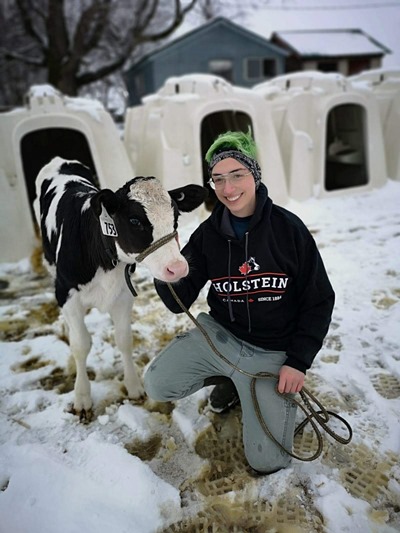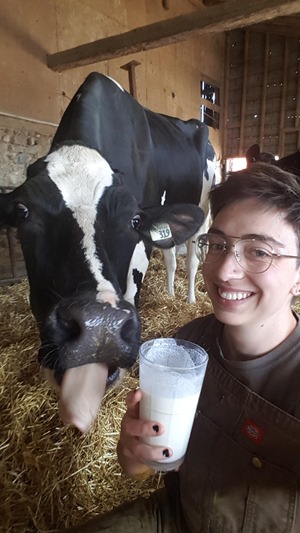JJ Hartley speaks to their experience as a transgender queer person with a passion for the dairy industry
By Jackie Clark
Staff Writer
Farms.com
As gender diversity becomes more widely understood in the ag community, adding pronouns to your introductions may come as easily as your name and a smile upon meeting someone.
“My name is JJ, I also go by Juno, I use they/them pronouns.”
JJ Hartley introduced themselves thus at the beginning of their conversation with Farms.com about what it’s like to live as a transgender person working in the agricultural industry.
“I work for the Holstein Association of Canada as a genetic parentage customer service rep. I do ancestry research and genetic testing validation for Holstein dairy cattle. I also have a second job as a relief milker on weekends,” Hartley explained.
They are originally from Saskatchewan, where their family had a cash crop and cow/calf operation.
“I wasn’t really ever engaged in it because it just wasn’t something I found very interesting,” Hartley said. “You have thousands of acres and driving big equipment just wasn’t something that appealed to me.”
Hartley got a degree in food chemistry from McGill University, studying at the campus shared with agricultural students there.
“I ended up working for the university and being employed by the dairy barn. Very quickly I thought ‘farming actually doesn’t suck so much, and I think I was just introduced to a type of farming that didn’t suit my interests,’” they explained. Dairy farming “is definitely something that I’m very passionate about now.”
Discovering Identity
While Hartley was finding their passion for the dairy industry, they were also learning more about their identity. Hartley is a transgender person, which means they don’t identify with the gender they were assigned at birth. Hartley is agender, which means they don’t identify with a specific gender.
It took Hartley time and critical thinking to understand and claim that identity.
“I’m a transgender person and I’m also queer,” Hartley explained. “Where I grew up was very sheltered.”
In that community, there was little representation of LGBTQ2S+ people.
“A lot of the exposure to members of the queer community that I had growing up was very tokenized. Often it was mocked or misrepresented,” Hartley explained. “I had a lot of internalized homophobia and transphobia.”
Not having that representation “definitely kept me from exploring my identity and being comfortable with myself,” they added.
At McGill, Hartley had more exposure to people from all walks of life and diverse experiences.
“I had been talking to another transgender person about the experience of identity before I had ever come to terms with my own,” Hartley explained “All throughout the conversation and I was like ‘wait, is that not how everyone feels?”
Hartley realized that their trans friend’s experience of gender closely reflected Hartley’s own.
“I always thought or felt gender was something that was ascribed to me,” they said. “Because I didn’t know differently, I accepted what I was told and ascribed at first. After a while, I realized none of that actually applies to me at all.”
Most of Hartley’s friends were cisgender meaning they identify with the gender that they were assigned at birth.
“I didn’t really have anyone to go to and ask how to unpack my experience as a trans person,” they said. “It was very lonely, even though I had a lot of allies. I think that’s why I want to be open for others to see.”
Hartley came to understand that they do not have to perform traditional appearances or behaviours ascribed to a certain gender and did not have to identify with a gender at all.
“That was very empowering,” they said.
Living as a Transgender Person
Transgender people are still working to be accepted and safe in society.
“As a trans person there are things that I have to explain about myself that the average cis person doesn’t have to explain,” Hartley said.
People feel entitled to Hartley’s story and personal information, when those questions and answers would never be demanded of a straight, cisgender person. The educational burden of explaining the transgender experience is often put on Hartley.
“In the office, I have my email signature and my pronouns are they/them,” they explained. “I still have people addressing me as a woman. And it’s very awkward to correct them, and when I do correct them, I have to go into this whole history of unpacking cisgender expectations and the fallacy of binary sex. And I shouldn’t have to do that. Other people don’t have to do that.”
Cisgender people don’t experience the same burden of emotional labour of explaining their identity to everyone they meet.
Hartley is often expected to speak for and represent all trans people, instead of just representing themself. Being transgender is a different experience for each individual.
“I don’t speak for my entire community, I speak only for myself. So, whatever you ascribe to me as a person that’s on me, that’s not on trans people,” Hartley explains. “Not every trans person you run into is obligated to explain their experience. It’s not our job to be an educator, it’s our job to live our experience.”

When asked what they wished more people understood about transgender people, “I just wanted to be treated like a person,” is what Hartley said.
“You don’t have to understand something in order to respect it,” they added. “It costs zero dollars and takes zero effort to respect other people’s pronouns. For the dozens of people I talk to every day, if they took two seconds to address me properly, that’s 90 per cent of my day that has been made better.”
Being Trans in the Ag World
“I think agriculture as a whole has been pretty accepting,” Hartley said. Many “farmers are very friendly people and I love talking with them. A lot of them are more than happy to put aside their qualms and just chat as people.”
However, Hartley has experienced pushback from folks in the rural and ag community.
“The barn that I work for, they’re great. I absolutely love them. And the owners are very receptive. They know I’m transgender, they know I’m nonbinary, they know I’m queer. They absolutely love me, they’re the nicest people I have ever met and they’re happy to have me,” Hartley said. “They’ve had to defend me from other people, though, simply for my being transgender and working for them.”
The owners of that farm “stood up for me. I love that show of allyship, that means a lot to me. But the fact of the matter is that they shouldn’t have to do that,” they explain. “It always surprises me when people take issue with who I am as a person irrespective of my work ethic or personality.”
That vocal pushback against their identity has been, frankly, traumatizing, Hartley said. “I’m very open to talking to people who disagree with me and who think that who I am or who I love is an affront to their sensibilities.”
However, because of the hate and violence that trans people often encounter, Hartley always has to consider if they are in a safe place to have those conversations.
“I often stay closeted,” Hartley explains. “People react with ambivalence, but also with verbal or emotional violence on occasion. This is my reality. I am harassed constantly, and have been mistreated very frequently. I can and do closet myself and swallow my discomfort in many spaces because the alternative is far worse.”
Hartley doesn’t often share those stories of bad experiences. They want to focus on the positive.
“The dairy farm I work for on weekends is one of the very few places where I feel completely safe, and I'm very fortunate to work where I do. The owners are filled with so much love, light and acceptance, and I wish more people were like that,” they explained.
“I exist as openly as I can for those who cannot. I know that as a kid, if I had seen someone like myself growing up, I would have felt much more comfortable in who I was much sooner,” Hartley added.
The Future
“I love being trans, I would not change it for the entire world. It’s been a fantastic experience getting to know myself … Sharing that for other people to see is something that I want to do,” Hartley said.
“I want to spread stories of trans joy, of queer joy and love. Of people who can exist just as their cis siblings do, and love who they are without fear of consequence,” they explained.
Hartley also wants to continue their career in dairy.
“The people I work with have a passion that is honestly completely unrivaled,” they explained. “I want this industry in my life. Professionally, no matter where I end up, five or ten years from now I will be a voice for the dairy industry. The work and dedication that dairy farmers have is something that I want to amplify.”
The dairy industry “is where I feel like I belong,” they add.

Readers looking to learn more can visit the website for the Canadian Centre for Gender and Sexual Diversity.